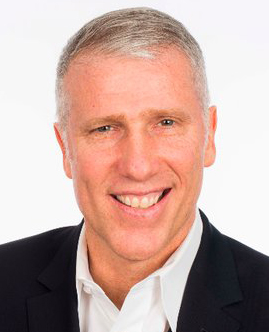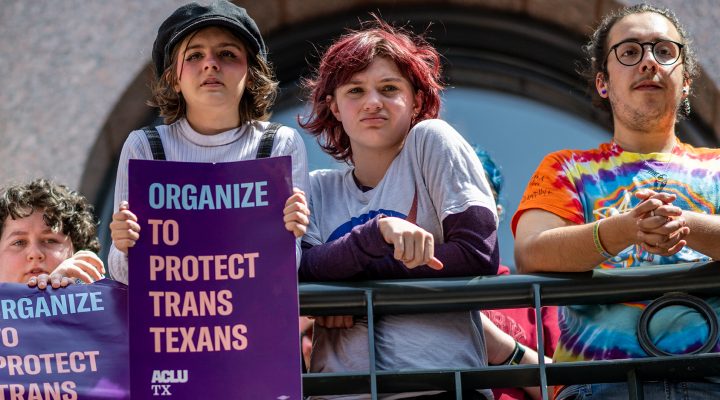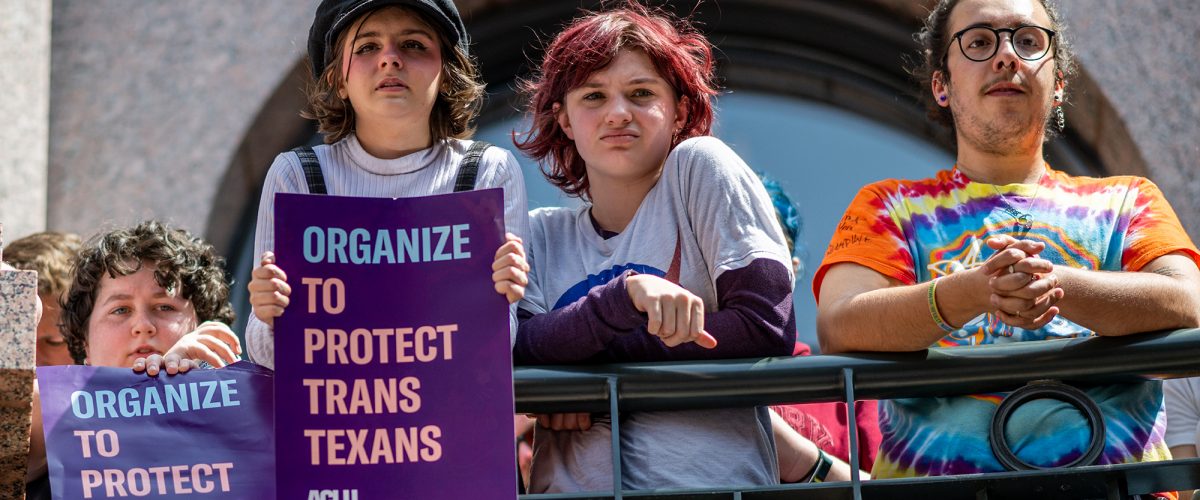Every November, the Princeton University Chapel would host a vigil for Transgender Day of Remembrance, commemorating the lives of trans people worldwide who had been victims of anti-trans violence. As associate dean of the chapel, I welcomed the university and local trans community into the large and somewhat forbidding Gothic chapel and ushered them up to the altar. Although grateful for the service, it was clear some were uncomfortable and wary in a religious setting.

Paul Raushenbush
And why wouldn’t they be? As we read the dozens of names of trans people who had been murdered, every life lost begged the question: Where were we religious leaders when those people needed our support the most — especially when so much of the anti-trans hatred and violence finds its inspiration in deadly religious dogma and rhetoric?
This year alone, 41 state legislatures are considering limiting the rights of LGBTQ people through more than 400 bills across the country. From attacks on free speech to the ability of all children to feel safe and included in schools to the right to seek essential gender-affirming medical care, these bills are cruel attempts to instill fear and prevent fellow Americans from being their authentic selves. In some cases, these bills are forcing families to flee the states that are enacting them.
This current onslaught of laws is not an accident. It represents a concerted effort to target a community most at the margins, with the least amount of public understanding, to gain political power. My family, including my husband and two kids, feels under attack by “don’t say gay” laws that seek to erase our family’s existence.
“This current onslaught of laws is not an accident. It represents a concerted effort to target a community most at the margins.”
Among all these laws, the ones targeting trans people and families with trans young people feel especially pernicious. A vocal proponent of these initiatives laid bare the dangerous intent behind these efforts at the Conservative Political Action Conference this month, declaring that transgender identity must be eradicated from public life entirely. Again, this begs the question: Where are the religious leaders to stand up for our LGBTQ siblings? No number of vigils will make up for our absence. We have to try to stop these attacks from happening to begin with.
Recently I spoke to Maharat Rori Picker Neiss, a St. Louis Jewish scholar and communal leader whose family includes a trans son. Picker Neiss said her main concern is caring for her child in a way that is loving and nurtures his full humanity within her faith tradition. Yet the Missouri state legislature is getting ready to pass laws that will make it that much harder for her as a parent and are a direct assault on her child’s rights, all in the quest for power.
Maharat Rori told me, “There is a choice that is coming at national levels to make the decision to politicize trans lives as a tool to advance people’s political careers. And that is what breaks my heart — because people have decided that my family is useful as a political tool.”
What is so galling is that many of these laws implicitly or explicitly use religion as a rationale for their intrusion, often citing care for the children as their primary concern. The presumption that the religious beliefs of government officials override those of the families caring for their trans children is outrageous. Not only does it fly in the face of church-state separation and the best medical advice, it denigrates the liberty of conscience and individual choice for countless families. As President Biden recently said, these initiatives are “sinful,” and religious leaders have an obligation to call it out wherever and whenever we see it happening.
“The presumption that the religious beliefs of government officials override those of the families caring for their trans children is outrageous.”
Fortunately, diverse religious leaders already are beginning to mobilize around the country. Recently, there was a prayer vigil in Jefferson City, led by religious leaders standing up for LGBTQ people and their families in Maharat Rori’s home state of Missouri. In North Dakota, a newly formed coalition of faith leaders has signed onto a letter in support of LGBTQ people that was printed in newspapers across the state. One of the faith leaders led a prayer in the Senate for people of all backgrounds, including all genders — which caused controversy when some legislators turned their backs on the prayer. And in Florida, multifaith leaders united to issue a “call for peace,” urging new legislation to strengthen non-discrimination protections for LGBTQ people.
That kind of outspoken bravery is what we need more of. We need to be loud, not only to defeat and roll back these invasive laws but also so trans people know there are religious people from a range of faiths who see them as who they are and celebrate them for it.
One clergywoman who preaches about this is Nicole Garcia, who is ordained in the Evangelical Lutheran Church of America and serves a congregation in Colorado. Garcia, a trans Latina woman, recently spoke about how her faith community’s embrace of her identity and humanity has been indispensable throughout her life. Addressing trans youth, she said, “You are made to be who you would be by your Creator. … I was supported and loved by my family and by my church and by the people who love me. Love and support can do amazing things.”
I pray all those who are called to lead spiritual and religious organizations of every kind will take seriously the mandate to love and support our trans siblings so no more names need be spoken on Trans Day of Remembrance. I pray they can live life fully now — just as they are.
Paul Brandeis Raushenbush, a Baptist minister, is president of Interfaith Alliance.
Related articles:
My home state is no longer safe for my family | Opinion by Lucas Land
Please pay attention to the plight of transgender children and their families | Opinion by Mark Wingfield
A pastoral letter to transgender children | Opinion by Ashley Robinson


